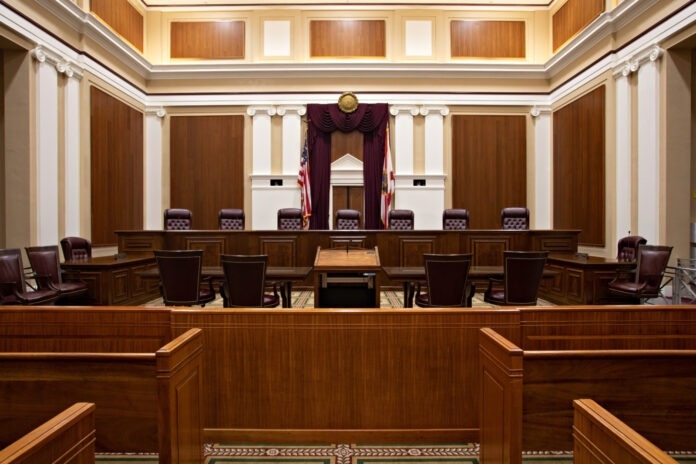By Jim McCarthy and Mandy Miles
A six-week abortion ban could soon take effect in Florida after the state Supreme Court upheld a ban on most abortions after 15 weeks of pregnancy on April 1. Voters will have a say on removing those restrictions, however, following a separate ruling by the Florida Supreme Court, released the same day, that approved the language of a ballot measure that would enshrine abortion access in the state’s constitution.
On April 1, the court ruled 6-1 on the state’s 15-week abortion ban, which passed in the Florida Legislature during the 2022 session. Gov. Ron DeSantis subsequently signed legislation with a July 1, 2022 effective date.
That same day, Planned Parenthood filed a lawsuit, bringing a state constitutional challenge to the House bill on grounds that it violated the Florida Constitution’s privacy clause. Adopted by voter referendum in 1980, the privacy clause guarantees the right “to be let alone and free from governmental intrusion into the person’s private life.”
Lawyers with Florida’s attorney general’s office told the court that the privacy clause was focused more on informational privacy, like personal records, and not abortion. In the privacy clause, it states that it shouldn’t be construed to limit the public’s right of access to public records and meetings as provided by law. Justice Jamie Grosshans, who wrote the majority opinion, stated there’s no support to the claim that voters understood abortion to be part of the rights recognized under the privacy clause.
“After considering each of these sources and consistent with longstanding principles of judicial deference to legislative enactments, we conclude there is no basis under the privacy clause to invalidate the statute,” Grosshans wrote.
Justice Jorge Labarga, the lone dissenter, stated the majority’s decision “recedes from decades of this court’s precedent.”
Florida joins other states that banned abortion at 15 weeks or less. Those moves were taken after the U.S. Supreme Court overturned Roe v. Wade in 2022 and gave authority to the states.
The court’s decision to uphold the 15-week ban thus triggers a newer six-week ban that state legislators passed during the 2023 session. Legislators wrote the bill in a way that it wouldn’t take effect unless the court upheld the 15-week ban. Now, the six-week ban is slated to take effect on May 1.
The abortion ban won’t apply if two physicians certify in writing that the termination of the pregnancy is necessary to save the woman’s life or avert serious risk of physical impairment of a major bodily function other than psychological condition. Or, two physicians must certify that the fetus has a fatal abnormality. The law allows for abortions in instances of rape or incest, Florida House Speaker Paul Renner said.
“It is a compromise that addresses where many Floridians are,” he said following the court’s ruling.
Planned Parenthood, in a statement following the ruling, said the abortion ban does nothing to protect a person’s health and safety.
“At Planned Parenthood, the doctors and nurses have seen firsthand the devastating impact abortion restrictions have had on patients in Florida and across the country. Lawmakers should focus on helping ensure greater access to care and healthier outcomes for patients, rather than interfering in Floridians’ personal medical decisions and attacking health care professionals,” the statement read.
Florida voters get final say in November
The new six-week ban on abortions in Florida may only last six months, as voters in November will be asked whether reasonable access to abortion should be included in the state’s constitution.
The campaign to protect women’s access to abortion, known as Floridians Protecting Freedom, spent nearly a year gathering the required number of signatures to put forth a proposed constitutional amendment. The group collected 996,512 signatures — more than 100,000 above the 891,523 that were needed by Feb. 1.
After hearing oral arguments on Feb. 7 from both sides of the issue — Floridians Protecting Freedom and Republican Attorney General Ashley Moody, who opposes abortion — the Florida Supreme Court on April 1 ruled that the language proposed for the ballot question was valid.
With the April 1 ruling, the court enabled voters to decide the state’s abortion policy.
In addition to statewide ballots in which voters choose a president, members of Congress and the Legislature and local officials, they will be asked whether they support a constitutional amendment that states: “No law shall prohibit, penalize, delay, or restrict abortion before viability or when necessary to protect the patient’s health, as determined by the patient’s healthcare provider.”
A fetus is typically considered viable, meaning it could survive outside the womb, around 24 weeks.
The two major rulings that came down on April 1 are likely to shine a brighter national light on Florida politics, as abortion has proven to be a tough issue for Republicans, even in historically Republican states such as Kansas, where voters in 2022 overwhelmingly shot down a proposed constitutional amendment in their state that would have limited access to abortion.
The amendment would need the approval of 60 percent of Florida voters to pass.




















